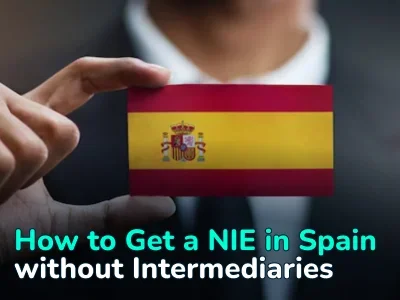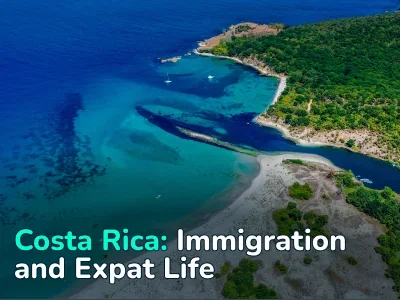
A Temporary Resident Permit, a Permanent Resident Permit, and Citizenship. What are the differences, and which should one choose?
The desire to live and work in another country can happen to anyone. But how can one do it legally? For this purpose, it is necessary to have the right of residence or citizenship in this country. In this article, we will explain in detail the differences between a temporary residence permit, a permanent residence permit, and citizenship, the opportunities each option provides, and the ways to obtain residency and citizenship.
Details on the Temporary Residence Permit
A residence permit is a document that allows you to reside in the country for a specified period of up to 5 years, depending on the conditions of obtaining it. To maintain the status, it is necessary to reside in the country for at least 183 days per year and to renew the residence permit when it expires.
Each country has its own categories of residence permits and associated requirements. For exact information on this, you should refer to the citizenship legislation of the specific country.
Not to be confused with a visa
People often confuse a residence permit with a long-term visa, but in fact, these are different documents that grant different rights.
A visa allows you to cross the border of a state for a specific purpose (e.g., study, work, leisure, or medical treatment).
Unlike a visa, a residence permit confirms the right of a foreigner or stateless person to live on the territory of a state. Although a residence permit can also certify identity and give the right to enter the country, this is not its only function.
What a temporary residence permit gives?
Having a residence permit, you can:
- live in the country;
- buy real estate;
- be engaged in business;
- study in public or private institutions;
- use medical services;
- obtain a driver's license and buy a car;
- travel visa-free to Schengen countries.
How can you get a temporary residence permit?
There are many ways to get a residence permit. Marriage, study, and work are the most common. In addition, almost every country has special conditions for investors, businessmen, scientists, and highly qualified specialists.
Here are a few ways to get a residence permit:
- Creating a business and jobs.
- Working in the country on a labor contract.
- Reunification with family.
- Entering a university.
- Conducting official activities (relevant to diplomats, representatives of international organizations, etc.).
- Scientific activity.
- Prolonged medical treatment.
- Proof of one's value to the state (special merits, volunteer work).
- Participation in the program for investors called “Golden Visa.” They operate in several EU countries, and it is the fastest way to a residence permit. Recently, however, such initiatives have been closed by country after country.
Details on the Permanent Residence Permit
A permanent residence permit gives you the right to reside in the country indefinitely. The period of validity of a permanent residence permit is unlimited, while a temporary residence permit requires regular renewal. The permanent residence permit card itself must be renewed every five years.
What a Permanent Residence Permit gives?
A permanent residence permit in Europe gives a foreigner more rights and privileges than a residence permit:
- A permanent residence permit is issued for life and does not require periodic confirmation.
- This permit allows you to work in any position for private companies.
- Also, this permit gives access to all social and economic benefits available to citizens of the country.
When traveling in Europe, the same rules apply to holders of temporary residence permits and permanent residence permits: you can stay without a visa in the other Schengen countries for 90 days within six months.
If you compare the rights of holders of a permanent residence permit and citizens of the country, they are almost identical. Holders of a Permanent Residence Permit can permanently live, work, do business, and enjoy social benefits in the country. The only limitation is the inability to participate in elections and work in public office.
How can you get a permanent residence permit?
To become eligible for permanent residency, you must first obtain a temporary residency permit. After several years of legal and uninterrupted residence in the country, it is usually possible to apply for permanent residency status, which is usually only available after three years or more.
Details about the citizenship
Citizenship is the last link in the chain: Temporary Residence Permit—Permanent Residence Permit—Citizenship. A citizen no longer has any restrictions on their rights.
The naturalization process, which leads to citizenship, consists of three steps:
- Obtaining a residence permit and living in the country for 3 to 8 years.
- Obtaining a permanent residence permit and living in the country for another 3–5 years.
- Applying for citizenship.
This process involves a gradual strengthening of ties with the country.
Other ways of acquiring citizenship include citizenship by birth, kinship, or descent; marriage to a citizen of the country; and citizenship by investment.
What is the difference between dual and second citizenship? Explained in detail
What gives a temporary residence permit, a permanent residence permit, and citizenship—a comparative table
|
|
|
|
|
|
|
|
|
|
|
|
|
|
|
|
|
|
|
|
|
|
|
|
|
|
|
|
|
|
|
|
|
|
|
|
|
|
|
|
|
|
|
|
|
|
|
|
|
|
|
|
|
|
|
|
|
|
|
|
What to choose: a temporary residence permit, a permanent residence permit, or citizenship?
The choice between a temporary residence permit, a permanent residence permit, and citizenship depends on your situation and goals.
If you are temporarily working or studying in another country and plan to return home later, the best option for you is a temporary residence permit. It allows you to legally live and work in the country for the duration of your stay.
If, after some time, you want to stay in the country permanently but will not be ready to apply for citizenship, the best choice would be permanent residency. It will give you the right to live and work permanently in the country without the need to constantly renew your status.
If you plan to stay in the country on a long-term basis and have all the privileges of a citizen, then it is worth getting citizenship.
You can choose a suitable immigration program on our website.
Author
I am responsible for editorial work. I write expert interviews and guides.






















